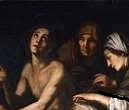This post begins a journey of reading, contemplating, and discerning God’s word. I was a lector at my parish yesterday for the first reading from the Book of Amos. I will begin this journey by writing my thoughts on the first reading yesterday.
Amos was a shepherd, a dresser of sycamore trees, and a herdsman. Amos was not wealthy. He was a prophet. Amos often wrote about social injustice, greed, and impending divine judgment for Israel’s corrupt practices and rejection of God. What corrupt practices concerned Amos? Well, in this reading, Amos condemns the practices of the rich who are wicked:
“Woe to those who are at ease in Zion,
And to those who feel secure on the
Mountain of Samaria,
the notable men of the first of the
nations.
To whom the house of Israel come!
Woe to those who lie upon beds of
Ivory.
and stretch themselves upon their
couches.
and eat lambs from the flock,
and calves from the midst of the stall;
who sing idle songs to the sound of the
harp.
and like David incent for themselves
instruments of music;
who drink wine in bowls,
and anoint themselves with the finest
oils.
but are not grieved over the ruin of
Joseph!
Therefore they shall now be the first of
those to go into exile,
and the revelry of those who stretch
themselves shall pass away.”
Amos, 6:1, 4-7 (NRSV).
So, what’s going on here? First, the context: Amos is railing against the sinful, wealthy of the northern tribes of Israel. “Joseph” is one of the names for the northern tribes. Other names for the northern tribes included “Ephrain,” “Samaria,” and “Israel.” Here, Amos uses “Joseph” to name the northern tribes. Second, at the time Amos was writing, in the 8th century B.C., the northern tribes (e.g., “Joseph”) were rife with wickedness and idolatry. But notice that Amos also warns against the “complacent in Zion.” Zion is the name for Jerusalem. Amos is telling Israel (Joseph) and Jerusalem that these sins will lead Israel and Jerusalem into exile. But notice that Amos is not warning against sins of commission, such as worshipping false idols, he is warning against sins of omission, that is, failing or refusing to do something good or dutiful that one is capable of doing and should be doing. Here, Amos is emphasizing the the slothfulness, laziness, gluttony, and luxurious lives of the Israeli wealthy, ruling class.
Third, these are extremely wealthy people. With what is Amos concerned? Amos is railing against their sloth that has led them to be indifferent to the sufferings that are going on around them in the ten tribes of Joseph (northern kingdom) and to the sin that is taking place amongst those ten tribes. Their sinful indifference to the needs of others will lead ironically cause them to be the first people to go into exile. Put put it more concretely, they will suffer first and will suffer the most. They will bear the brunt of the Assyrian empire coming in and decimating the northern kingdom and exiling the rich and wealthy described here.
Amos is warning the rich that if they keep living these lives of luxury, gluttony, sloth, and indifference they will suffer first and suffer the most. Divine Judgment will come down upon them in the form of the Assyrian exile. Unlike the Gospel reading of this week, Amos talks about the sins of the wealthy leading to earthly punishments, whereas Jesus in the Gospel talks about the sins of the rich man leading to eternal punishment in the world to come or in the life to come.
In closing, I have reflected on how I am the rich, slothful, indifferent man described by Amos. The man indifferent to the sufferings around him. Perhaps this reading is a challenge to me and to others to see the suffering of others and recognize the responsibility to help them and realize that by helping others, I ultimately help myself. God Bless.
“
